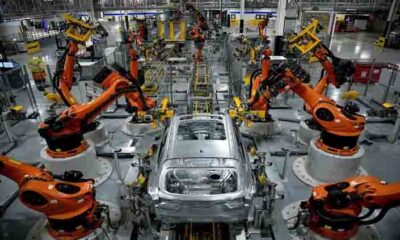Software was a big theme for automakers attending CES 2023 in January. BMW, Stellantis, Volkswagen and a joint venture between Honda and Sony showed off upcoming or concept vehicles that are significantly reliant on computers and code. The takeaway was clear: More and more vehicles will be run top to bottom by software, not hardware. In some cases, the future is already here.
What will it be like for shoppers when vehicles are dominated by bits and bytes instead of gears and gaskets? Edmunds’ experts break down what’s in store.
SOFTWARE-DEFINED VEHICLES
The phrase “software-defined vehicle” is an industry term used to clarify the difference between a traditional car that is enhanced by technology and one that is run by technology.
While cars of the past 20 years have gained touchscreens and have plenty of engines- and safety-related computing power, those software features are largely stuck in time once the car rolls off the assembly line. The future holds that nearly every vehicle feature will be controlled by software, which offers the potential to improve features over time.
Another key difference is updatability. Consider the smartphone. Their manufacturers seamlessly update their software on a regular basis to fix bugs and breaches and add functionality. Software-defined vehicles work similarly. They have high-speed Wi-Fi and cellular connections that automakers use to send out software updates via the cloud to their vehicles. There’s no need for owners to bring their vehicles to a dealership or service centre.
A NEW DAY AND A NEW FEATURE FOR YOUR CAR
Tesla is a pioneer in adding software-based features to its vehicles. Over the years it has introduced improvements to the touchscreen interfaces and added new features such as video games. It’s even issued updates that enhance vehicle performance. Startup EV brands Lucid and Rivian are following suit by employing over-the-air updates to give their vehicles new features and functions and issue bug fixes.
The software also allows for the introduction of features that wouldn’t have been possible in the past. Genesis, Hyundai’s luxury arm, is using facial recognition and fingerprint scanning with its new all-electric GV60 crossover. The physical key is required to set up both functions, but after that, the owner can basically operate the car as easily as a smartphone.
Established companies are jumping in as well. Last summer, Ford used software to enable its BlueCruise hands-free driving system in tens of thousands of F-150s and Mustang Mach-Es. The vehicles had the hardware for the system already installed; the over-the-air update made it complete. It applied to the cars wirelessly, without the need for a dealer visit.
Maintenance is another potential advantage. These highly digital vehicles can monitor preventive and predictive maintenance and even diagnose problems from afar. It takes the guesswork out of what could go wrong and what needs to be adjusted without a visit to a mechanic shop or dealership.
THE DOWNSIDE OF THIS NEW TECH
Software allows new features that wouldn’t have been possible in the past. But sometimes these features aren’t so great in practice. Tesla and Rivian, for example, use touchscreen-based controls to direct the flow of the cabin’s air vents. It seems neat in theory but turns out to be a finicky and distracting process in real-world driving. Old-school air vents that you adjust by hand just work better.
Software crashes and glitches are also problematic. Issues that PC users are all too familiar with cane crop up in cars. It might be a touchscreen that goes blank and is inoperable while the driving, glitchy operation of certain controls, or advanced driver assist features that aren’t as fully vetted as they should be before being added to vehicles.
The risks of software crashes and privacy breaches are real issues. It’s not outside the realm of possibility for someone with malicious intentions to take over the operation of a car and cause damage. Also, some experts are both applauding the technology and advising caution as it relates to personal data privacy: the more data collected from drivers, the more potential for hacking.
EDMUNDS SAYS:
The software will continue to evolve to change the vehicle ownership experience. Test-driving different new vehicles offer a sense of how much digital functionality you prefer. You might enjoy the opportunity for a quick fix or update via Wi-Fi. But technology-averse shoppers will likely prefer a vehicle with a more traditional design, which might include buying used.
Post Views: 154


 Fashion3 months ago
Fashion3 months ago
 Sports3 months ago
Sports3 months ago
 Sports3 months ago
Sports3 months ago
 Fashion2 months ago
Fashion2 months ago
 pakistan3 months ago
pakistan3 months ago
 World3 months ago
World3 months ago
 pakistan3 months ago
pakistan3 months ago
 Tech3 months ago
Tech3 months ago






















